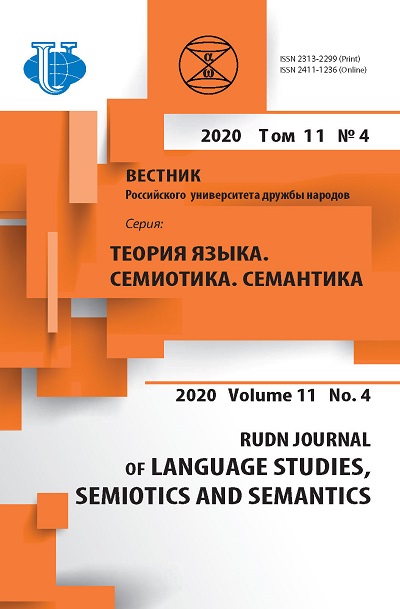Artificial “Intelligence” and the Human Mind: Futuristic Synecdoche and Reality (Linguistic and Linguomental Aspects)
- Authors: Volkov V.V.1
-
Affiliations:
- Tver State University
- Issue: Vol 11, No 4 (2020)
- Pages: 745-759
- Section: COGNITIVE RESEARCH
- URL: https://journals.rudn.ru/semiotics-semantics/article/view/25049
- DOI: https://doi.org/10.22363/2313-2299-2020-11-4-745-759
- ID: 25049
Cite item
Full Text
Abstract
The study aims to make a model of the semantic processes taking place during hermeneutic interpretation of the Russian terminological word-combination искусственный интеллект ( artificial intelligence ) in comparison with the noun ум ( mind ). The relevance of the work is due to the fact that “naïve” (i.e., who does not have special knowledge) native speakers tend to identify (1) mind, (2) intelligence, (3) those imitations of human cognitive activities that are associated with the use of automata and computer equipment. The semantics of the noun ум ( mind ) refers to everything that is connected with consciousness in all its manifestations; in this sense, the concept of “mind” is among the “primary concepts” that cannot be correctly defined. The word интеллект (“intelligence”) captures only a certain “part of the mind”, namely, the cognitive abilities. The human mind, consciousness is beyond the capabilities of computer imitation; intelligence, understood as “cognitive abilities”, is partially amenable to techno-electronic modeling. The term искусственный интеллект ( artificial intelligence ) is constructed as a “double synecdoche”: 1) a part instead of a whole (“intelligence” as a part - “mind” as a whole); 2) a whole instead of a part (“intelligence” as a whole - representing this whole set of electrical impulses in the computer - “a mechanism for working with data”). The semantic result is the basis of the transhuman ideology, which is based on the identification of the mind, intelligence, and computer simulations. The term “artificial intelligence” in stylistic and cultural aspects: 1) personification of the mechanism (robot, automaton, computer), 2) depersonification of the person (human); in general - depersonificational travesty. The personification of virtual simulation “intelligence” and depersonification of real, authentic intelligence / mind are interpreted as the neutralization of privative antonymic opposition, as the formation of a virtual “middle element”, which is related to the “dehumanization of human race” as a fundamental problem of our time.
About the authors
Valery V. Volkov
Tver State University
Author for correspondence.
Email: volk7valery@yandex.ru
Doctor of Philology, Professor, Department of Russian Language
St. Zhelyabova, 33, Tver, Russian Federation, 170100References
- Mikeshina, L.A. (2009). Hermeneutics. In: Encyclopedia of epistemology and philosophy of science. Moscow: Canon+; Rehabilitation. (In Russ.).
- Bakhtin, M.M. (2003). Collected works: in 7 vols. Vol. 1. Moscow: Languages of Slavic Culture. (In Russ.).
- Gadamer, H.-G. (1988) Truth and method. The basics of the philosophical hermeneutics. Moscow: Progress. (In Russ.).
- Bogin, G.I. (2001). Philological hermeneutics in Tver University. RUDN Journal of Studies in Literature and Journalism, 5, 86—91. (In Russ.).
- Volkov, V.V. (2015). Semantic core of the concept “Human” in the light of Latin and Latinized nominations. RUDN Journal of Language Studies, Semiotics and Semantics, 1, 83—92. (In Russ.).
- Volkov, V.V. (2020). “Digital economy”: Linguistic and linguomental aspects. Philology. Theory & Practice, 7, 135—139. (In Russ.).
- Aristotle (1983). Works: in 4 vols. Vol. 4. Moscow: Mysl. (In Russ.).
- Mamardashvili, M.K. (2011). Forms and content of thought. Saint Petersburg: Azbuka-Attikus. (In Russ.).
- Latest large explanatory dictionary of the Russian language (2008) / ed. S.A. Kuznetsov. Saint Petersburg: Norint. (In Russ.).
- Encyclopedia of philosophy (1967). Moscow: Sovetskaya encyclopedia. Vol. 4. (In Russ.).
- Dvoretskiy, I.Kh. (1976). Latin-Russian dictionary. Moscow: Russian language. (In Russ.).
- Rozanov, V.V. (2006). On understanding. Experience in the study of nature, boundaries and internal structure of science as integral knowledge. Moscow: Institute of philosophy, theology and history of St. Thomas. (In Russ.).
- Dorot, V.L. & Novikov, F.A. (2004). Explanatory dictionary of modern computer vocabulary. Saint Petersburg: BHV-Petersburg. (In Russ.).
- Explanatory dictionary of the Russian language of the beginning of the XXI century: Current vocabulary (2008) / ed. G. N. Sklyarevskaya. Moscow: Eksmo. (In Russ.).
- Khoruzhiy, S.S. (2008). The problem of a posthuman, or transformative anthropology through the eyes of synergetic anthropology. Filosofskie nauki, 2, 10—31. (In Russ.).
- Literary encyclopedia of terms and concepts (2001) / ed. & comp. A.N. Nikolyukin. Moscow: Intelvak. (In Russ.).
- Novikov, L.A. (1984). Russian antonymy and its lexicographic description. In: Lvov M.R. Dictionary of Russian antonyms. Moscow: Russian language. (In Russ.).
- Losev, A.F. (1993). Being — name — space. Moscow: Mysl. (In Russ.).
Supplementary files












